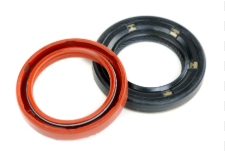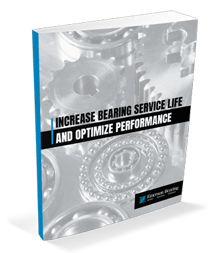Oil seals, also known as grease or dirt seals, are an essential component of many machines and pieces of industrial equipment. An oil seal is designed to retain grease in a case or housing and close the gaps between stationary and moving components in pieces of machinery.
An example of this in the automotive industry is the seals within gear boots that enclose a car’s CV axles. Of course, there are many different applications across industries in which oil seals prevent the escape of vital lubricants and ensure the continued smooth operation of the machine in question.
Guidelines for Proper Use of Oil Seals
 To function properly, seals must be utilized according to a narrow set of operational parameters. Oil seals have two basic functions that keep a piece of machinery running:
To function properly, seals must be utilized according to a narrow set of operational parameters. Oil seals have two basic functions that keep a piece of machinery running:
- Seals fill voids or gaps between stationary and moving components of a mechanical system. This allows for the retention of crucial lubricating oils, greases, or other elements within the housing where the seal is attached. In turn, these lubricants let the machinery continue to operate smoothly.
- Seals double as a protective barrier against outside contaminants, such as water, rust particles, particulates, and other substances that are potentially harmful to the mechanical components located behind the seal.
When selecting the correct oil seal for your application, it is important to match the right elastomer compound to your machinery’s use case. There are several variables to consider, such as:
- Normal operating temperature
- Operating temperature limits under unusual circumstances
- Type of lubricant used
- Shaft and housing tolerances
- External environmental factors
It is vital to select the correct elastomer compound for your oil seal with these considerations in mind. Elastomers unsuitable for their end applications could lead to corrosive water, abrasive particles, or other harmful contaminants entering into the mechanical equipment’s housing, and causing severe damage to the machinery. Thus, a careful analysis of your application’s specific operational parameters, as well as the machinery’s external environment, is critical when selecting a durable and useful oil seal.
For many industrial applications, nitrile is the top choice due to its exceptional resistance to abrasion. The second most common elastomer is fluoro-elastomer, due to its excellent chemical and heat-resistance capabilities.
Oil Seals From Emerson
At Emerson Bearing, we offer several different oil seals that are suitable for a range of applications. Our three main options are:
- Inch Measurement Oil Seals. Our products are available in both imperial and metric dimensions, and come in both single-lip and double-lip designs. We can customize these seals to meet stringent demands for temperature and chemical resistance.
- Metric Oil Seals. We use a variety of lip materials to overcome even the most daunting design challenges. We also work with a range of materials, such as nitrile and Viton®, which is highly suitable for low compression, high temperature operations.
- Garlock Isolator Style Oil Seals.For severe applications, Garlock Isolator Style seals provide numerous advantages. They feature a one-piece design, no friction from metal-on-metal contact, no shaft wear, and compatibility with a range of Goulds pumps. They are also easy to install, and come in both non-metallic (ISO-GUARD) and metallic (GUARDIAN) forms.
 From factory production lines to automotive engines, oil seals are an essential component of many pieces of machinery. It’s imperative to carefully consider the oil seals your company is using and how to get the most out of them.
From factory production lines to automotive engines, oil seals are an essential component of many pieces of machinery. It’s imperative to carefully consider the oil seals your company is using and how to get the most out of them.
To learn more about the importance of oil seals and their different features, download our eBook, Increase Bearing Service Life and Optimize Performance today. Reach out to our team at Emerson Bearing for any oil seal questions you may have.






